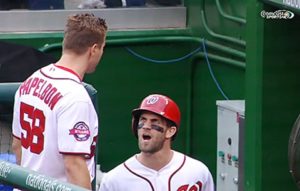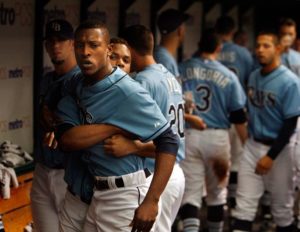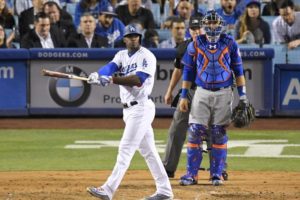Yasiel Puig is among a handful of players who are constantly being policed for his on-the-field antics. Whether celebrating a home run or taking out anger over a strikeout, players are not shy about showing emotion during the game.
The supposed problem comes when a player on the opposing team gets offended. This is one of the “unwritten rules” of baseball and that you don’t show up the opposing team. The discussion about weather or not unwritten rules are right or wrong can be found elsewhere; this is about the players who take the offense personally and take things into their own hands.
Puig was the center of attention on Wednesday night when he belted a three-run home run to extend the Dodgers’ lead over the New York Mets. Puig pulled a page out of Domingo Ayala’s playbook and did not start walking until he crossed a certain line. He adjusted his belt buckle rather than pop his chain, but there was no question about the self-admiration taking place.
Wilmer Flores took quick exception to the walking and trotting of Puig. Flores told Puig to move it along, and Puig responded with an expletive (according to Flores). The Mets really had no room for more embarrassment. A team in the World Series just two years ago has not lived up to expectations this season and is struggling with injury after injury. They are lucky to not have to field an entire Triple-A team at this point in the season.
The altercation between Puig and Flores was minimal compared to other situations where players take the law into their own hands. One of the more famous incidents occurred in 2013 when Carlos Gomez (then with the Milwaukee Brewers) hit a home run off of Atlanta Braves’ pitcher Paul Maholm. Gomez was visibly boastful and had words for the pitcher going towards first base. Freddie Freeman gave an earful right back to Gomez, followed by more chirping as Carlos Gomez rounded the bases.
Waiting at home plate was the Fight Club ringleader, Brian McCann. McCann did not allow Gomez to touch home plate and looked like he was never letting him get the chance. Shoving ensued as players from both teams surrounded the argument and there was actually a well-maintained atmosphere considering the built up drama.
 Players can lay into their own teammates as well. Doing something to anger your teammates can result in just as much of a confrontation. Except there will only be one team involved in any fights that break out. If you recall from 2015, Bryce Harper and Jonathan Papelbon had a little skirmish in the dugout after Harper didn’t run out a fly ball to Papelbon’s liking. The two exchanged words and Papelbon proceeded to grab Harper before teammates came running over to break up the altercation.
Players can lay into their own teammates as well. Doing something to anger your teammates can result in just as much of a confrontation. Except there will only be one team involved in any fights that break out. If you recall from 2015, Bryce Harper and Jonathan Papelbon had a little skirmish in the dugout after Harper didn’t run out a fly ball to Papelbon’s liking. The two exchanged words and Papelbon proceeded to grab Harper before teammates came running over to break up the altercation.
A situation similar to the Nationals happened in Tampa Bay in 2013. Evan Longoria got onto teammate B.J. Upton (Melvin Upton Jr.). Upton apparently was not hustling to get a ball in the gap and throw it in. Longoria took exception and let Upton know he was not pleased with his lack of effort. The result was a confrontation in the dugout that led to teammates restraining Upton.

B.J. Upton policed by Evan Longoria for a lack of hustle on defense
Cameras see these types of in-team altercations on the field, but they are typically not discussed outside the clubhouse after they occur. Internal conflicts are best dealt with amongst players and coaches without the presence of reporters to inflate comments and stir the pot with headlines. If players do have a problem with their own teammates and go public with it, they could find themselves out of a job like Miguel Montero. He criticized Jake Arrieta for a slow delivery to the plate, costing Montero the time needed to throw out base stealers. There was no showdown between the two on or off the field, but simply going public with the conflict caused Joe Maddon and the Cubs to designate Montero for assignment the next day.
Whether or not players agree with the actions of others, there are undoubtedly a handful of Major Leaguers who will take enforcement and retaliation into their own hands. The umpires are only able to do so much in a game to stop tempers from flaring. Once the words and actions start getting out of control, the players are the first line of defense. Opponents don’t want to be disrespected, and teammates want full effort and respect for the game. The interpretations of these values vary between players, but the end result is the fact that players have policed themselves and don’t always need MLB officials to do it for them.


Leave a Reply